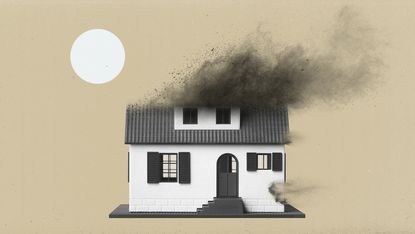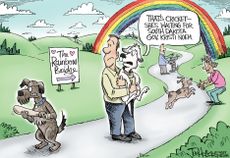Is the UK about to see ‘biggest ever’ house price crash?
House prices have risen for fourth month in a row but it remains a 'buyers' market

House prices rose in January for the fourth successive month, dampening fears of an impending property market crash.
The average price of a property in the UK last month increased by 1.3% – or £3,900 – to £291,029 compared to December, according to Halifax, and was up 2.5% year on year. Having previously fallen for six consecutive months, house prices have now risen for the last four months in a row.
But experts have warned that the market was teetering on the brink of a historic crash as a result of soaring mortgage rates following 14 consecutive hikes to the Bank of England's base rate.
Subscribe to The Week
Escape your echo chamber. Get the facts behind the news, plus analysis from multiple perspectives.

Sign up for The Week's Free Newsletters
From our morning news briefing to a weekly Good News Newsletter, get the best of The Week delivered directly to your inbox.
From our morning news briefing to a weekly Good News Newsletter, get the best of The Week delivered directly to your inbox.
What's happened?
Between the start of 2020 and autumn 2022, house prices across most of the UK "rose steeply", said the BBC, by about 25%. But a subsequent drop has affected millions of homeowners.
Climbing interest rates have made mortgages increasingly expensive, preventing many would-be buyers from getting on to the property ladder despite the recent falls in asking prices.
The cost-of-living crisis has also "hit people's spending power", the broadcaster added, and has forced some homeowners to sell up, further destabilising the market.
Could history repeat itself?
The year-on-year price drops in August and September were the "most substantial" since the 2009 financial crisis, said The Times Money Mentor, and they triggered fears of a repeat occurrence.
During the credit crunch, many people lost their homes or became mortgage prisoners struggling to cope with unaffordable deals.
Although current UK house prices "haven't gone into full meltdown", said Harvey Jones in The Express, "it's going to be a close run thing". The situation is "unlikely to get better over the rest of this year, and may get a lot worse".
The market has been "roiled" by the hefty increases in borrowing costs, said The Times. Bank of England data showed that the number of new mortgages approved in August dropped from 49,500 to 45,000 – significantly "worse than the 48,000 forecast by economists", the newspaper added.
How has the UK been impacted?
In 2023, "all UK nations and the nine English regions" recorded house price falls, said FT Adviser, but northern locations did prove to be "more resilient" than those in the south.
Although the feeling in the market is more optimistic now, Halifax's 2.5% annual house price rise should be put into context, said The Times Money Mentor. It "represents a stark change" for the UK housing market, for which a 10% year-on-year increase in prices "hasn’t been unusual during the past decade".
Property website Zoopla reported a 12% increase in buyer demand for homes in the first few weeks of January compared to the year before, in a sign that the market may be recovering.
But there has been an "increase in the supply of homes for sale" and it remains a "buyer's" market, with "more than one in five sellers forced to accept offers that are at least 10% less than the asking price". With "buyers in the driver's seat", it "could take time for house prices to climb back".
What happens next?
"Leading indicators of house prices remain downbeat, so we suspect price falls will resume in the coming months," Andrew Wishart, analyst at Capital Economics, told This is Money.
Rishi Sunak has refused to offer extra help to homeowners struggling with mortgage payments, instead urging banks to offer "bespoke support", said The Independent. The prime minister has promised to stick to his plan to halve inflation.
Opinion is still split on whether there will be a full-blown house price crash, however.
Last year, the Office for Budget Responsibility predicted a 10% drop in house prices over the next two years. But the predictions are "very uncertain", said the BBC.
Some observers have said there may be a "soft landing", the broadcaster added, with "small price falls" throughout the rest of the year, and then "little, if any, growth" in 2024.
However, an expert from Zoopla predicted house prices would fall by 22% by 2026.
Ultimately, because the market is "complex" it is "difficult to predict with certainty what will happen in the future", said Purplebricks.
Some hope that the Bank of England's decision to hold the base rate at 5.25% may provide some relief to the mortgage market, as lenders pass on the revised cost of borrowing. If buyers face lower housing costs, mortgage approvals are likely to increase and house prices could stabilise.
Following the news that the rate of inflation has remained at 4% – despite forecasters predicting a rise – all eyes are on the next Bank of England rates decision. Interest rates "could start to fall soon", said the i news site, but the governor of the Bank has warned that they might stay above 2% for years to come.
The Bank's decisions will have major implications for affordability, rates and prices going forward.
Create an account with the same email registered to your subscription to unlock access.
Sign up for Today's Best Articles in your inbox
A free daily email with the biggest news stories of the day – and the best features from TheWeek.com
Rebekah Evans joined The Week as newsletter editor in 2023 and has written on subjects ranging from Ukraine and Afghanistan to fast fashion and "brotox". She started her career at Reach plc, where she cut her teeth on news, before pivoting into personal finance at the height of the pandemic and cost-of-living crisis. Social affairs is another of her passions, and she has interviewed people from across the world and from all walks of life. Rebekah completed an NCTJ with the Press Association and has written for publications including The Guardian, The Week magazine, the Press Association and local newspapers.
-
 5 high-caliber cartoons about Kristi Noem shooting her puppy
5 high-caliber cartoons about Kristi Noem shooting her puppyCartoons Artists take on the rainbow bridge, a farm upstate, and more
By The Week US Published
-
 The Week Unwrapped: Why is the world running low on blood?
The Week Unwrapped: Why is the world running low on blood?Podcast Scientists believe universal donor blood is within reach – plus, the row over an immersive D-Day simulation, and an Ozempic faux pas
By The Week Staff Published
-
 Rishi Sunak's asylum spat with Ireland explained
Rishi Sunak's asylum spat with Ireland explainedIn Depth Irish government plans to override court ruling that the UK is unsafe for asylum seekers
By The Week UK Published
-
 The true story of Feud: Capote vs. The Swans
The true story of Feud: Capote vs. The SwansIn depth The writer's fall from grace with his high-flying socialite friends in 1960s Manhattan is captured in a new Disney+ series
By Adrienne Wyper, The Week UK Published
-
 Will George R.R. Martin ever finish 'The Winds of Winter'?
Will George R.R. Martin ever finish 'The Winds of Winter'?In Depth The much-anticipated sequel has been a long, long, long time coming
By Brendan Morrow Published
-
 Workism: how the workplace became America's newest place of worship
Workism: how the workplace became America's newest place of worshipIn depth The office has become the center of people's lives
By Theara Coleman, The Week US Published
-
 Light shows: after-dark displays in the UK this winter
Light shows: after-dark displays in the UK this winterIn depth Illuminations events to enjoy in January and February 2024
By Adrienne Wyper Published
-
 Ripley: what to expect from the new Netflix series starring Andrew Scott
Ripley: what to expect from the new Netflix series starring Andrew ScottIn depth A new adaptation of the Patricia Highsmith psychological thriller is set to hit the small screen
By Adrienne Wyper Published
-
 Tobago travel guide: beaches, rainforests and feasting
Tobago travel guide: beaches, rainforests and feastingIn Depth Unwind to the beat of this small island's unique rhythm
By Dominic Kocur Published
-
 Gladiators reboot and the return of linear teatime TV
Gladiators reboot and the return of linear teatime TVIn Depth Relaunch of the 90s hit show proves popular, despite non-bingeable, one-episode-a-week release
By Adrienne Wyper Published
-
 25 of America's most unexpectedly banned books
25 of America's most unexpectedly banned booksIn Depth From 'Harriet the Spy' to 'Little Red Riding Hood,' these books have all fallen afoul of censors
By The Week Staff Published